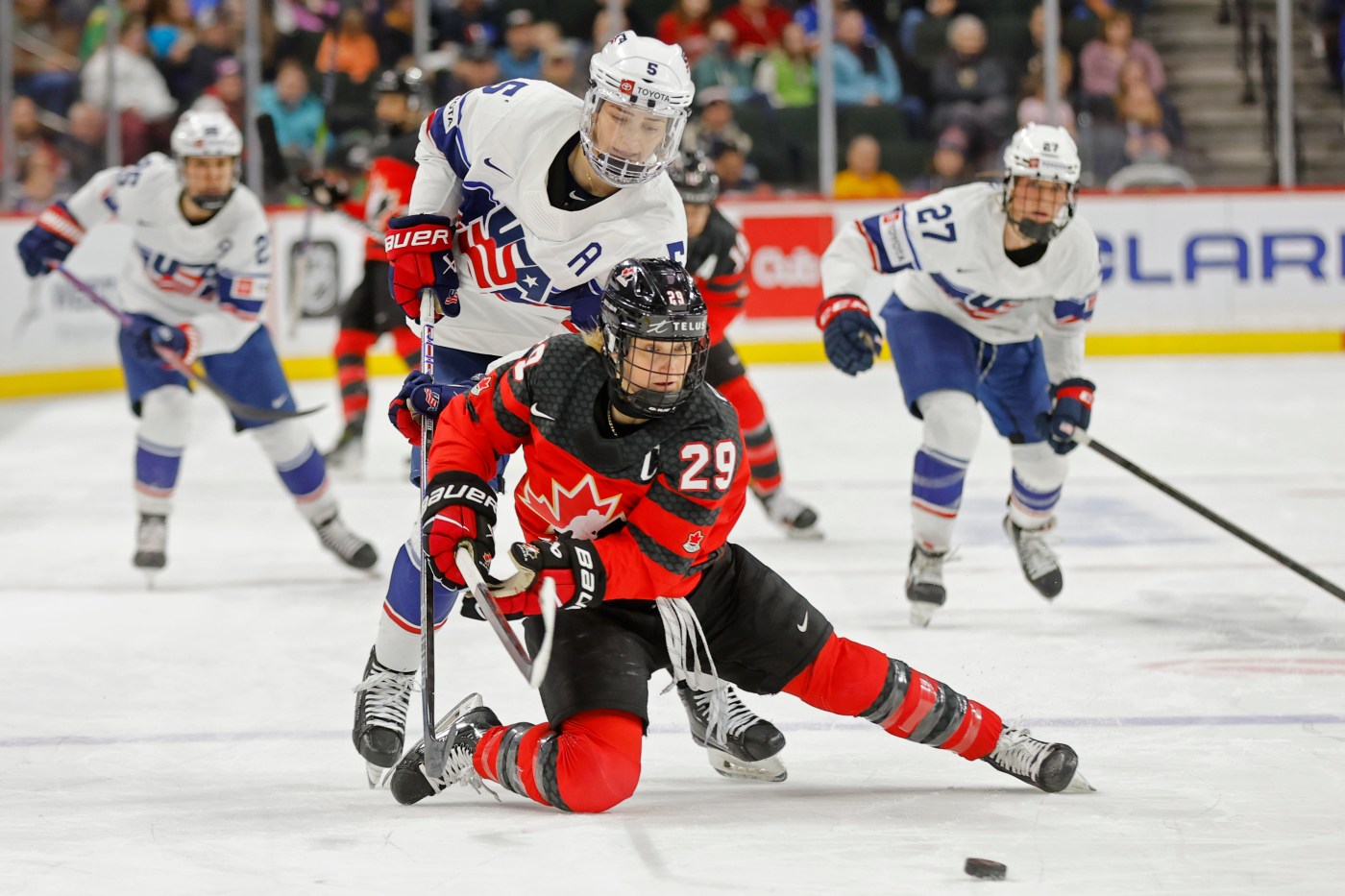
Women’s hockey: Canada beats U.S. in deciding Game 7 of Rivalry Series in St. Paul
Members of the U.S. women’s national hockey team can take solace in the fact that it was only an exhibition.
They left Xcel Energy Center on Sunday afternoon with bruised egos following a 6-1 drubbing by Team Canada in the deciding Game 7 of the Rivalry Series. But a key injury sustained in the game had real consequences, and it is one that hits close to home.
Former Gophers star Taylor Heise, now playing for Team Minnesota in the Professional Women’s Hockey League, left the game in the second period due to what appeared to be an upper-body injury and did not return.
There was no word on whether Heise will be available when Team Minnesota resumes PWHL play on Wednesday.
While acknowledging that his team was outplayed, Team USA coach John Wroblewski said that the loss of Heise certainly had an impact on the game.
“That’s going to be a tough one,” Wroblewski said. “You lose your (No. 1 center), your power-play catalyst for the No. 1 unit. She was unbelievable in Game 2. I can’t imagine how disappointed she was in not being able to continue in tonight’s game.”
Disappointment was the operative word for Team USA, which was hoping to reverse the momentum after seeing Team Canada come back from a 3-0 series deficit to set up Sunday’s deciding game.
Team USA lost twice in Canadian arenas last week and was looking for home-ice advantage to help provide a reversal of fortune.
“It’s disappointing anywhere, especially on home soil,” Team USA winger Kendall Coyne Schofield said. “Any time you put on that red, white and blue you’ve got to execute better, it doesn’t matter if it’s here, there or anywhere in the world.”
Coyne Schofield said the tenor of the series definitely changed after Team USA went up 3-0.
“It didn’t seem like the momentum ever swung back our way,” she said. “But we have to earn that momentum swing, and I don’t think we did that.”
Team USA did not have the services of its entire roster the past three games because some key players remained with their college teams. Wroblewski said that played a role in the way the series turned.
“We lost in a shutout in Game 4 (in December),” he said, “and then you inject five (defenseman) that have no experience together at the national team level. That’s a big storyline.
“Not moving pucks as crisply is paramount against a team like Canada. We suffered in that department the last three games. It was a daunting experience for them.”
Team USA forward Grace Zumwinkle, who scored her team’s only goal, credited Team Canada for playing a solid Game 7.
“I tip my hat to them,” she said. “From the first drop of the puck they competed and played hard. For us, we tried to focus on that as well, but at the end of the day they executed a little better than we did.”
Team Canada scored the only goal of the first period. With Team USA defenseman Megan Keller in the penalty box for holding, Natalie Spooner beat Team USA goaltender Nicole Hensley off a scramble in front.
The second period began with Team Canada on a power play after Keller took her second penalty of the game with 27 seconds to play in the first period. Team Canada needed only 57 seconds to cash in, with Marie-Philip Poulin beating Hensley on a wrist shot from between the circles.
Team Canada’s lead grew to 3-0 midway through the second period on a goal by Ashton Bell, who was left alone in the slot to take a centering pass from Emma Maltais. At that point, Wroblewski elected to replace Hensley in goal with Abbey Levy.
Keller took her third penalty of the game at 16:21 of the second period, but this time it was Team USA that scored. Zumwinkle took the puck from Team Canada goaltender Ann-Renee Desbiens, who was out to play it in the corner, and scored into an open net.
But any momentum Team USA had gained was taken away 58 seconds later when Spooner scored her second goal of the game just after Keller’s penalty had ended.
Maltais scored twice for Team Canada in the third period, including once shorthanded,
“Giving up the two power-play goals and not matching that was a storyline in the series,” Wroblewski said. “That was the crux of the story the (last) three games.”
Team Canada has won the series three of the four years it has been played. It won the inaugural Rivalry Series in 2018-19, 2-1. Team USA won the series 4-1 the following season before a two-year hiatus.
Canada came back from a 3-0 deficit to win the series last year.


